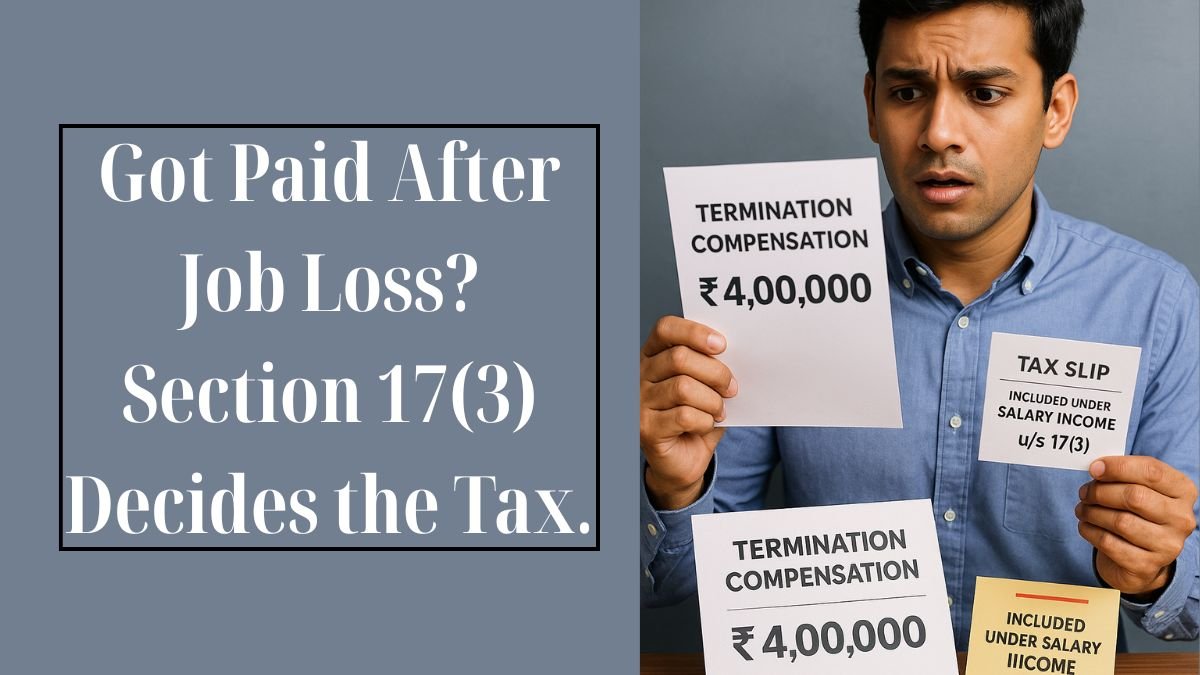
Salary Isn’t Always Just Cash in Hand
When we hear the word salary, most of us think of a monthly paycheck. But the Income Tax Act sees salary as a much broader term. It includes allowances, benefits, & even some perks that may not be paid out as cash.
This is where Section 17(3) of the Income Tax Act plays a crucial role. It ensures that benefits an employee receives from his employer, even if not part of the basic pay, are considered taxable income if they fall under the definition of profits instead of salary.
📘 What is Section 17(3) of Income Tax Act?
Section 17(3) defines "profits instead of salary" as any amount received by an employee from the employer or a third party, before joining, during the job, or even after leaving.
This includes:
- Compensation for termination or modification of job terms
- Payments received in connection with employment, other than the regular salary
- Certain voluntary payments that are not part of a statutory gratuity or pension
Put, if you're getting any allowance or perquisite from an employer, & it’s not specifically exempt, there’s a good chance it's taxable under Section 17(3).
💼 Real-Life Examples
Let’s look at some common scenarios:
- Voluntary Retirement Compensation (VRS)
If not covered under the exempt limits of Section 10(10C), such compensation is taxable under Section 17(3).
- Notice Pay Recovery
When an employee resigns without serving the notice period & the employer deducts the notice amount, any amount paid instead of notice can be considered profit instead of salary.
- Ex-Gratia Payments
Lump-sum amounts paid on retirement or resignation without a specific statutory obligation are generally taxable.
📄 What Qualifies Under Section 17(3)?
Here’s a quick summary of amounts included under this section:
|
Nature of Receipt |
Taxable? |
Under Section |
|
Compensation on termination |
Yes |
17(3)(i) |
|
Payment from an unrecognised provident fund |
Yes |
17(3)(ii) |
|
Pre-employment signing bonus |
Yes |
17(3)(iii) |
|
Allowances & perquisites outside regular salary |
Yes |
Remember: any allowance or perquisite given to an employee by their employer is taxable unless explicitly exempted under another section.
⚖️ Exceptions and Clarifications
While the scope of Section 17(3) is wide, it doesn’t include:
- Amounts specifically exempt under Section 10, like statutory gratuity, leave encashment, or VRS (if within prescribed limits).
- Payments are covered under recognised provident funds, approved superannuation funds, or statutory pension schemes.
These are taxed (or exempted) under different provisions. "
💰 How It’s Taxed
Any income falling under Section 17(3) is taxed as “Income from Salary” in the ITR.
- No separate head or section to report
- It must be added to the gross salary
- Taxed at applicable slab rates
- TDS (Tax Deducted at Source) may apply, especially in termination cases
🔍 Why It Exists: Curbing Salary Diversion Loopholes
This section helps the tax department ensure that salary-like income is not camouflaged as non-taxable perks or ex gratia payments.
Earlier, employers would offer certain fringe benefits or compensation through indirect channels, which often escaped taxation. Section 17(3) was introduced to close that gap.
💡 Insight: Section 17(3) and Form 12BA
For employees earning more than ₹1.5 lakh per annum (other than salary), employers are required to provide a Form 12BA—a detailed statement of perquisites & profits instead of salary.
This form discloses:
- Car facility
- Club memberships
- Gift vouchers
- Compensation
- Ex gratia bonuses
All these fall under scrutiny, & if taxable, are declared under Section 17(3) of the Income Tax Act.
❓ Frequently Asked Questions
- Is compensation for job loss taxable under Section 17(3)?
Yes, unless exempt under Section 10(10B) or 10(10C), such compensation is fully taxable. - Are signing bonuses received before joining a company taxable?
Yes, they fall under profits instead of salary & are taxed accordingly. - What if the payment comes from a third party?
Even if the payment is routed through a third party, but is related to employment, it is taxable under this section. "
📘 Section 17(3) in Hindi (Quick View)
"धारा 17(3) के तहत, किसी कर्मचारी को वेतन के अलावा नियोक्ता से प्राप्त कोई भी भत्ता या लाभ कर योग्य होता है। इसमें सेवा समाप्ति पर मुआवजा, एक्स-ग्रेसिया भुगतान, या अन्य गैर-वेतन लाभ शामिल हो सकते हैं।"
🧾 Summary Table
|
Particulars |
Covered Under Section 17(3)? |
|
Allowance/perquisite from the employer |
✅ Yes |
|
Compensation for early resignation |
✅ Yes |
|
Exempt gratuity |
❌ No |
|
Statutory leave encashment |
❌ No |
|
Unrecognised PF withdrawals |
✅ Yes |
✅ Final Thoughts
Whether you’re an employee negotiating a severance package or an employer structuring a benefits plan, understanding Section 17(3) of the Income Tax Act is critical.
It ensures that any allowance or perquisite given to an employee by their employer is taxable, & maintains salary benefits as transparent and tax-compliant as possible.
If you're receiving benefits from an employer outside of regular salary, always assess if it falls under profits in place of salary as per Section 17(3), or risk getting flagged during assessment.
💬 Need help with salary structuring or decoding Form 12BA?
Let the experts at CallMyCA.com handle your case with precision. Book a call today https://callmyca.com/business-tax-filing to optimise your tax outcome—whether you're an employee or an HR professional.











